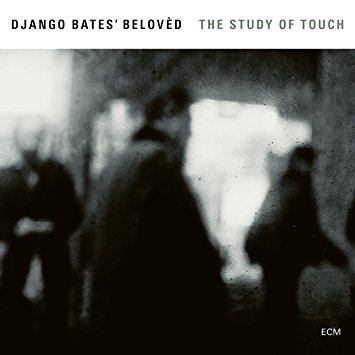Over his renowned career, Django Bates has recorded in a full range of scenarios; a solo pianist on Autumn Fires (and Green Shoots) (JMT, 1994) and recently, a musician/arranger/conductor of the Frankfurt Radio Big Band on Saluting Sgt. Pepper (Edition Records, 2017), Bates is at home in any setting.

As the album notes for The Study of Touch indicate, Bates had little interest in adding another piano trio to the jazz world but while teaching at the Copenhagen Rhythmic Music Academy in 2005 he came into contact with bassist Petter Eldh and drummer Peter Bruun and the Belovèd Trio was born. Their two previous albums Beloved Bird (2010) and Confirmation (2012), both on the Lost Marble label, were direct and indirect tributes to Charlie Parker but the Bird’s presence on The Study of Touch is a simple nod to the roots of the group.

The album opens with “Sadness All the Way Down,” Bates’ piano taking a somewhat more expansive view than the original from Confirmation. “Giorgiantics,” from that same album, starts the upward momentum into “Little Petherick,” formerly recorded by Human Chain on Summer Fruits (and Unrest) (JMT, 1993). Parker’s “Passport” is that sole tribute and not one appearing on the two previous Belovèd releases. Well into the album is “Slippage Street,” the first original piece on The Study of Touch and one that is bursting with those familiar, quirky Bates shapes and textures. The album returns to Confirmationas a source again with “Peonies As Promised” closing with “Happiness All the Way Up,” a counter-intuitive title for its touch of melancholy.
Parker seems to be neither an influence nor an afterthought on The Study of Touch, though notably, Beloved Bird selections are not part of the equation here. Still, it seems that in teaming with Eldh and Bruun, more than ten years back, Bates was simultaneously laying the groundwork for what has become his own version of a standards trio. In covering much of the trio’s previous work, Bates allows himself the luxury of poetic license by reinterpreting pieces through an always expanding lens. Bates, Eldh and Bruun seem a natural fit for the ECM label and it will be interesting to see where this relationship goes.
“The Study of Touch journeys eloquently from impressionist balladry and bucolic reverie to florid harmonic development and counterpoint swing. Bates leads gently, merging with the delicate chemistry between Eldh’s lines and Bruun’s swishes and taps while displaying a compositional grasp of form.”
– Mike Hobart, Financial Times
“Bates has his own individual voice and this has undoubtedly been greatly aided by his participation in so many disparate musical projects. Bates’ own compositional talents are wonderfully showcased here.” – Tim Stenhouse, UK Vibe







